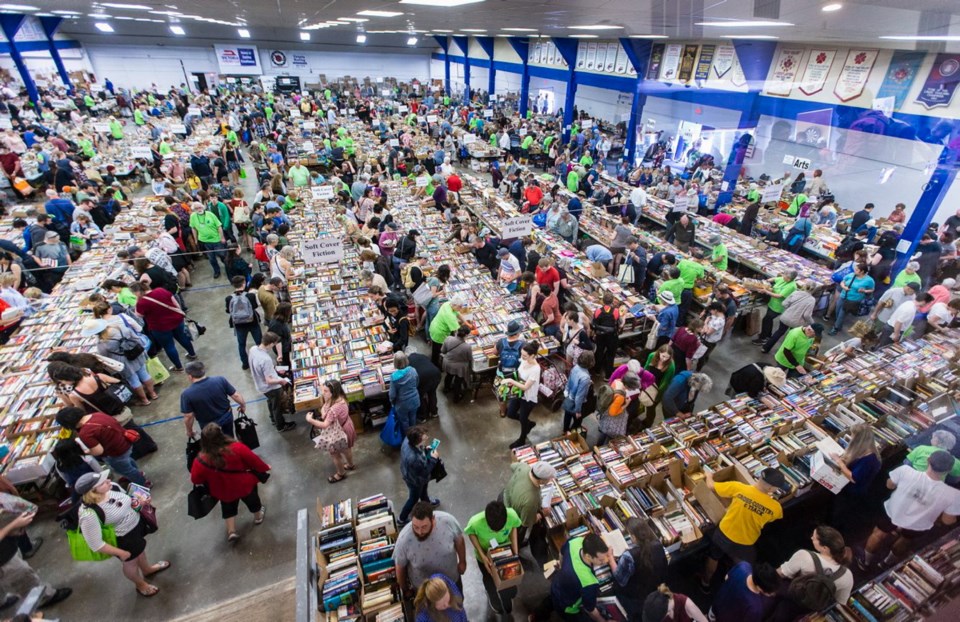Here’s an announcement we didn’t want to have to make: We’re postponing this spring’s ��ѻ��ý book sale.
Note the terminology, though. Postponing, not cancelling. We’re determined to make the annual literacy fundraiser happen once the COVID-19 dust has settled.
Listen to what the TC’s publisher and editor-in-chief, Dave Obee, had to say: “The benefits of the book sale are too great for it to simply be abandoned. The recipients of ��ѻ��ý Literacy Fund grants depend on that money. Our intent is to reschedule.”
Our goal is to have the sale in August, assuming the health authorities sound the all-clear. After that, the concrete floor of the site of the sale, the Victoria Curling Club, will be covered with ice.
The book-sale example illustrates a conundrum faced by concert promoters, sports leagues and anyone else considering putting on an event that could draw more than 250 participants: How do they plan? No one has a crystal ball showing when life will return to normal, when it will be safe to write on a calendar in ink.
If you’re putting on a music festival next week, it’s pretty obvious that you have to cancel. But what if your event is in June? What if you’re the Rolling Stones and your two-month North American tour is scheduled to begin May 8? For large-scale productions like that, or even the just-postponed TC 10K, the logistical dominoes have to begin falling weeks, months in advance.
Take the book drive. It has operated in the same way every year since its inception in 1998: books donated by readers at a drive-through drop-off are sorted by volunteers and sold at a two-day sale. Not only is it a great deal for book buyers (really, the lineup is longer than the doomsday prepper queue at Costco) but all the money goes to literacy-related programs on Vancouver Island.
From set-up to cleanup, the sale takes about four weeks. In the early years, it was always a challenge to find a venue that was both large enough to hold the event and owned by someone in a position to make the location available for a month. The book sale vagabonded around temporarily vacant downtown buildings — the old Bay, the old Brick on Quadra Street, the former NOW furniture store on Douglas — before they were redeveloped.
The event finally landed at the curling club in 2010. It’s a perfect match. Once the ice melts at the end of curling season, the book drive moves in. That’s why the collection is held on a weekend at the end of April and the sale two weeks later in May.
The problem now is that there were a whole bunch of things that needed to happen soon — scrounging 300-odd trestle tables, lining up fencing, finding first-aid staff, arranging phone lines for point-of-sale machines — for the event to happen as scheduled. We couldn’t go ahead without knowing if restrictions would be eased by May. We needed certainty that we do not have.
The most important consideration was the health of the hundreds of volunteers who are the engine that drives the book sale. Many are retirees, are of the age deemed most vulnerable to COVID-19. Then there was the image of thousands of buyers, cheek to jowl in a giant, crowded room, everyone pawing over the same books. Not what comes to mind when thinking of social distancing.
We hope the volunteers, many of whom clear their calendars to be available each spring, will still be able to show up when the rescheduled sale gets the green light. We hope the book donors and buyers will appear, too.
For it really is a good cause. This year, the book sale generated the greatest part of the more than $300,000 (about a third of that total came from matching funds from the Education Ministry) that the ��ѻ��ý Literacy Fund distributed to 180 beneficiaries, mostly schools. As one of those who got to play Santa Claus, hand-delivering cheques, I can attest that school librarians are like kids on Christmas day when their grants arrive.
Then there are the other recipients, from a Mustard Seed Street Church project that provides school supplies to those who can’t afford them, to Victoria Literacy ��ѻ��ýion programs that prevent children from being left behind in life.
So, while we’re shelving the ��ѻ��ý book sale for now, we’re not closing the book.



